« September 2007 | Main | November 2007 »
October 30, 2007
Denver International Film Festival - Thirty Years On

I got my tickets Monday afternoon to the Denver International Film Festival. I was given passes to six films which isn't very much, but considering my work schedule is keeping me from seeing more films, I would not have seen much more than that anyways. Those of you who have seen some of the films showing up here may be voicing your opionions about what I should have gotten tickets for. As it was, with only Sundays and Tuesdays available, I tried to find a balance between what I really wanted to see, plus take advantage of those films I might not see otherwise. I may be able to see a few more films on screeners.
The films I'll be seeing on the not so big screens of the Starz Theater will be Faces of a Fig Tree and Cool School on November 11; Tuya's Marriage and Teeth on November 13, concluding with the new Jacques Rivette film and Four Month, Three Weeks and Two Days.
This will be my first time going to the festival as "press". My relationship with the festival goes back to the first film festival held in May of 1978. Through my mother, who was writing for the Denver Post at the time, I got connected to Ron Hecht, the festival founder. I wrote notes for several of the films, a few of which I had already seen in New York City the previous year. Hecht had run one of the couple of "art theaters" in Denver, The Vogue, and had served as a production assistant to Robert Altman on Nashville. Altman was the first filmmaker to be honored at the festival where he presented an advanced screening of A Wedding. During that first year, and for several years after that, the film festival was held for an extended weekend. What made it challenging to attend was that screenings were held in three different theaters simultaneously. This meant not only choosing films based on the schedule but also location, factoring driving and parking. One of those theaters was The Esquire, pictured above.
I forgot when the festival shifted to the Fall, but in 1984 the festival was held at a three screen multiplex. This meant it was easier to attend different films and catch a meal nearby. Among the celebrities to show up that year were Steve Martin and Jonathan Demme. The festival ended on a down note when news got out that Francois Truffaut had died.
Based on the schedule for this years festival, there are a few changes. The tributes are not emphasized as in the past when Lillian Gish or John Schlesinger showed up. Probably fewer people would show up, but for this year's tribute to Norman Jewison, I would have chosen two films not available on DVD, Gaily, Gaily with Beau Bridges as the young Ben Hecht, and The Art of Love because it stars both Angie Dickinson and Elke Sommer. As for Stephen Goldblatt, I understand that someone is trying to gear up the audience for his latest film. Instead of two films by Mike Nichols, I would have chosen Return of the Soldier because it has both Julie Christie and Ann-Margret. There is no John Cassavetes award this year (an award, I should add that existed well before the same named Independant Spirit award). Considering that John Sie has been instrumental in supporting the fesival and giving it a home, I would think the award would be given to one of the most improvisational of filmmakers, Wong Kar-Wai.
On a more personal note, one of the films I may miss, unless a screener is available, is Mardik: From Baghdad to Hollywood. I briefly got to know Mardik Martin at NYU where he was teaching filmmaking at the time. My one enduring memory is sitting near him when we were part of the audience of Dick Cavett's show in 1969. We went primarily because one of the guests was Federico Fellini. What had some of us in stitches was when Cavett's other guest appeared. While the most of the audience clapped and cheered, Martin was yelling out, "Hey Bernie, Bernie Schwartz!".
Posted by Peter Nellhaus at 12:11 AM | Comments (3)
October 29, 2007
Demonic Possession - Italian Style

Malabimba
Andrea Bianchi (as Andrew White) - 1979
Severin Films Region 1 DVD

La Bimba di Satana/Satan's Baby Doll
Mario Bianchi (as Alan W. Cools) - 1982
Severin Films Region 0 DVD
I had to made sure that these were two different films. Both stories take place in huge remote castles. The nubile daughter is possessed by the angry spirit of her dead mother. Both girls have uncles confined to a wheel chair. Both films have Mariangela Giordano in similar roles, wearing almost identical nun's habits. And both films are directed by guys with the same last name, both using the time-honored tradition of signing their films with Anglo pseudonyms. If that's not enough, both films represent the single film appearances of Katell Laennec and Jacqueline Dupre in the starring roles.

If imitation is the sincerest form of flattery, William Friedkin may still be blushing. If nothing else, these two films are evidence of the impact The Exorcist had, years after its initial release. Malabimba begins with a seance led by the wide eyed Elisa Mainardi. The name may not be familiar, but the face is one that has appeared in several Fellini films for good reason. After zipping open Enzo Fisichella's fly and ripping off Patrizia Webley's dress, the spirit takes over the young daughter played by Ms. Laennec. Not only does Laennec speak in a very low voice and run around in various states of undress, but she does things with her stuffed dolls that would probably bar her from future visits to FAO Schwarz.
In Satan's Baby Doll, Jacqueline Dupre is also possessed by the spirit of her mother. Additionally, the dead mother, portrayed by the appropriately named porn star Marina Hedman physically reappears to haunt the family. There is one nod to classic horror films when the Devil worshipping servant is killed by a reanimated mummy shortly after having chicken dinner in the manner of Tyrone Power. Satan's Baby Doll also is the only film I know of with a scene of lesbian necrophilia. And sure enough, it should be noted that Malabimba and Satan's Baby Doll were both written by the prolific Piero Regnoli. The auteur of Playgirls and the Vampire proves that when it comes to sex and horror, some things just can't stay buried.

Posted by Peter Nellhaus at 12:32 AM | Comments (2)
October 28, 2007
Coffee Break

Sonya Wilde and Pat Michon in I Passed for White (Fred M. Wilcox - 1960)
Posted by Peter Nellhaus at 12:48 AM
October 27, 2007
Crooks Anonymous

Ken Annakin - 1962
Wham! USA Region 1 DVD
Even without Julie Christie, Crooks Anonymous is enjoyable. Written by frequent collaborator Jack Davies, Ken Annakin has a very sarcastic comedy, funnier than many of the British films that use to play in U.S. art houses when the weren't showing La Dolce Vita or the latest film with Brigitte Bardot. The story is of a pickpocket who has trouble going straight, finding himself in a special program for reformed crooks. The scene of Leslie Phillips locked in a room full of safes, each with a special booby-trap is quite funny. Notable also is a scene of a Christmas Eve heist by six Santas.
Crooks Anonymous will probably be best remembered for featuring the debut film performance of Julie Christie as Phillips' stripper girlfriend. It's the kind of role that in earlier films would have been performed by someone like Diana Dors or Shirley Eaton. Thanks primarily to John Schlesinger, Christie has had a remarkable career showcasing both her beauty and acting talent. Still, as a longtime admirer, I have to admit to enjoying seeing Julie Christie when she was merely the latest slice of British cheesecake.












Posted by Peter Nellhaus at 12:57 AM
October 25, 2007
Contact Ponette

Ponette
Jacques Doillon - 1996
Fox Lorber Region 1 DVD
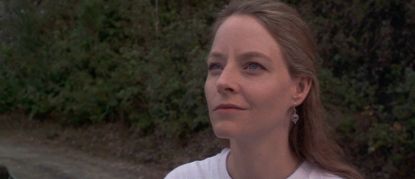
Contact
Robert Zemeckis -1997
Warner Brothers Region 1 DVD
A little bit of film humor that has stayed with me involves the title of a non-existent fim book titled Double Meanings in Double Features. There are some films that seem to echo each other, sometimes unintentionally. I have long thought that Ponette and Contact share some remarkable similarities. I once wrote a short note to Roger Ebert about this after reading an article he wrote about other films that seem to have unconsciously share several narrative elements. I got a rather snide response from the thumbmaster. But consider this, both Ponette and Contact are about solitary young women who feel some responsibility for the death of a parent, and in spite of the urgings of others, attempt to contact the dead parent. There are also scenes of these lonely characters staring into space. Both films are essentially about an individual's sense of faith and the proof of that faith. My own faith is that by sharing some of the images below, others might see the similarities I see between these two films.


The awkward kissing scene.


The reunion with the dead parent.


Proof that contact was made with the dead parent.
Posted by Peter Nellhaus at 12:19 AM
October 23, 2007
The Blood Spattered Bride

La Novia Ensangrentada
Vicente Aranda - 1972
Blue Underground Region 0 DVD
Last night I saw Vicente Aranda's film, one of several inspired by Sheridan Le Fanu's story, "Carmilla". By uncanny coincidence, Kimberly Lindbergs posted her review of Blood and Roses, the first film to adapt Le Fanu's story to a contemporary setting. I cannot discuss Vadim's version as I have only seen part of it on cable, almost twenty years ago. What was probably not coincidence is that Aranda made his version of "Carmilla" within two years of release the Hammer production, The Vampire Lovers. Aranda's version takes advantage of the newly given freedom following the changes in the MPAA ratings in 1968, combining the more explicit sex and violence of the Hammer film with Vadim's contemporary setting. One also cannot discount the interest in Le Fanu's character as a reaction to militant feminism.
Additionally, Aranda was influenced by Roman Polanski's Repulsion. This is clearly indicated in the opening scene when newlywed Susan is alone in the bridal suite while her husband is parking the car. Susan peers into an empty closet, walks away for a moment, opens it again, and a man dressed completely in black overpowers the young woman in white. When the husband finally appears, finding his bride holding herself alone on the bed, we realize the attack took place in Susan's imagination. From this point on, it is established that Susan's attitude towards sex is ambivalent at best. The husband's insensitivity further pushes Susan away.

Aranda's Carmilla appears as Le Fanu's describes her in her wedding dress. Some of the dialogue of the film is also from Le Fanu's story. While there is a generous amount of nudity in the film, Aranda's most erotic moment, between Carmilla and Susan, is off camera. Additionally, Aranda has chosen to withhold enough information so that it is never clear whether Carmilla is actually a vampire, or someone who thinks she is one of the undead. Not hidden is the symbolism of the guns, knives and traps. By the end of the film, it is clear that The Blood Spatterd Bride is as much about masculine power and the fear of the feminine as it is about a vampire seeking revenge.
It is worth noting that Vicente Aranda is still making films at age 81. Considering Aranda's career has spanned the cultural and political changes in Spain, as well as making films in a variety of genres, Aranda is certainly a filmmaker who needs to be known by more than a couple of titles by English language film scholars.

Posted by Peter Nellhaus at 02:03 PM
October 22, 2007
The Double Feature Blog-a-thon: Bride of the Gorilla at Large
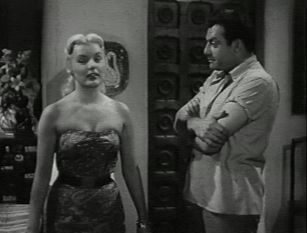
Bride of the Gorilla
Curt Siodmak - 1951
Alpha Video Region 1 DVD

Gorilla at Large
Harmon Jones - 1954
20th Century-Fox Region 1 DVD
One of the sillier genres of the Fifties involves gorillas on the loose with a reasonably attractive white woman in peril. What these two films also have in common is that the women in peril are both the screen wives of Raymond Burr. Any film with Raymond Burr and a gorilla will probably strike some as visually redundant. Both are tall, dark, and large. Even before he really started to pack on the pounds, Burr was virtually compared to an elephant, playing a character in Great Day in the Morning named Jumbo Means. The similarilty of Burr to a gorilla was probably not lost on anyone at the time these films were made and the films, as trivial as they are, can stand as a testament to one actor's perseverance before becoming the symbolic kind of the TV jungle with "Perry Mason".

Bride of the Gorilla has a storyline that is almost a reworked version of Curt Siodmak's The Wolfman. Lon Chaney, Jr. is in the film for good measure, oddly cast as the chief of police in the small jungle town. Filmed in the wilds of a West Hollywood backlot, Bride of the Gorilla is one of those fantasies made up of almost random cultural and geographical elements. What may raise more eyebrows than the cutaway shots of animals in this mythical South American jungle, is the dialogue between Burr and beloved bad girl, Barbara Payton.
Those familiar with the personal histories of these two actors will recognize the skill involved when Burr and Payton discuss the sanctity of marriage. Almost as convincing are the special effects when Burr, the victim of an old woman's curse, turns into a gorilla. Siodmak had the sense to minimize the shots of the guy running around in the bad gorilla costume, a lesson probably learned from his time with Val Lewton. Just as Burr and Payton were going in different directions with their respective careers, the cast also includes Tom Conway doing what he can with life after The Falcon, and Woody Strode in one of his earliest performances. Best of all are the big eyes of veteran character actor Gisela Werbisek.
Harmon Jones edited films for William Wellman, Joseph Mankiewicz and several times for Elia Kazan. During all that time, he didn't seem to learn much about film directing. There is a scene in Gorilla at Large where Jones cuts between the carnival audience, Anne Bancroft on the trapeze, and the gorilla. It took me a couple of minutes to realize that that everything was taking place in the same space. The plot involves some murders at the carnival originally blamed on a gorilla named Goliath.
What makes Gorilla at Large worth watching, if not too closely, is to see two future Oscar winners, Bancroft and Lee Marvin, plus Lee J. Cobb and Cameron Mitchell from the original stage production of Death of a Saleman, all in the same film. There may be an intended moment of recalling Arthur Miller when Cobb's paternal feelings towards Mitchell are discussed. The best scenes in the film belong to Marvin, hilarious as a clueless, sleepyheaded cop. The nod to King Kong, when Goliath tries to grab Bancroft in her bed, may elicit a chuckle. Calling to mind another tall, dark and oversized actor, there is the one scene in Gorilla at Large, a reworking of the funhouse mirrors scene in Lady from Shanghai, with a guy in a bad gorilla costume in place of Orson Welles.
Readers continue seeing double at Broken Projector.

Posted by Peter Nellhaus at 12:54 AM | Comments (3)
October 21, 2007
Coffee Break

Henry Fonda in You Only Live Once (Fritz Lang - 1937)
Posted by Peter Nellhaus at 12:44 AM
October 19, 2007
Vital
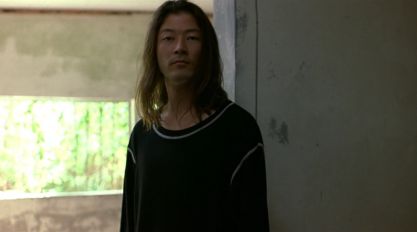
Shinya Tsukamoto - 2004
Tartan Video Region 1 DVD
Even though it is marketed as another J-Horror entry, Vital indicates that Shinya Tsukamoto has more on his mind than frightening his audience with another genre excersise. The scenes that could easily be played for easy screams from the squimish are quite restrained. Tsukamoto is more interested in reflecting on the alienation felt by his characters, and how memory brings some people closer while driving others apart. To a certain extent Vital even made me think of Antonioni with the beautiful would-be lovers who will never get together, the fascination with the modern city, the empty rooms and abstract looking landscapes.
On the surface, the story of a medical student who dissects the body of his dead girlfriend is not only preposterous, but probably considered unethical. Beyond the questionable premise is the exploration of a young man, Hiroshi, attempting to regain lost memories by exploring the corpse of Ryoko. In the meantime, fellow student Ikumi finds that as attracted as she is to Hiroshi, she cannot compete against the woman who reappears in Hiroshi's dreams.
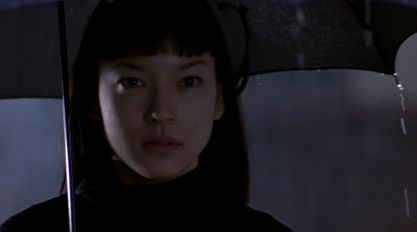
Tsukamoto breaks away from his narrative to concentrate on abstract images of buildings, shadows, smoke and rain. More interested in the living than the dead, there are close-ups of the three main actors - Tadanobu Asano, Kiki and Nami Tsukamoto. Most astonishing of all is Nami Tsukamoto, unrelated to the filmmaker. A ballet dancer, she is given two scenes of brief solo dancing. The dances appear to be butoh inspired, particularly with the jerky, convulsive movements. Shinya Tsukamoto almost undermines the beauty of Nami Tsukamoto's dance on the beach with too much camera movement. The kinetic glory of this scene is so good that an except has been included in Tartan's teaser reel of their Asia Extreme films. There is enough visual beauty in Vital to make me hope that Shinya Tsukamoto might break away from the horror genre, much as David Cronenberg has, at least enough so that more people are aware of his artistry.
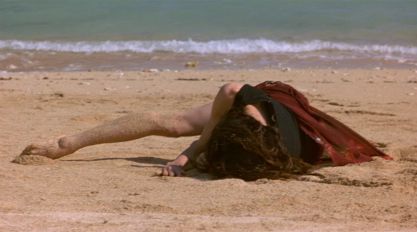
Posted by Peter Nellhaus at 12:18 AM
October 18, 2007
Deborah Kerr: 1921 - 2007

Posted by Peter Nellhaus at 02:03 PM
October 17, 2007
The Montgomery Clift Blog-a-thon: The Young Lions

Edward Dmytryk - 1958
20th Century-Fox Region 1 DVD
In an inteview in The Paris Review, Irwin Shaw discusses how he originally wanted to link his three main characters in his novel, The Young Lions. It is some of the links to Montgomery Clift's life and career that are more interesting than the actual film. Aside from the fact that the two top billed stars, Clift and Marlon Brando, never actually share screen time, the film is overlong with too many dull stretches. It is almost no surprise that in alternating two or three stories over a running time of 167 minutes, the most watchable scenes almost always are those with Dean Martin.
Like From Here to Eternity, The Young Lions is based on a big, and best-selling novel about World War II by a tough guy novelist. Once again, Clift gets to demonstrate his boxing abilities. In the case of the later film, Dean Martin took a cut in pay to establish himself as a more capable actor like Sinatra before him, with the help of Clift. As it turned out, what is one of Martin's best performances is the role of Dude in Rio Bravo, a part originally offered to Clift. Too what extent Montgomery and Martin were friends off-screen has not been fully documented. I can imagine that at least on an intuitive level, Dean Martin understood that like himself, Montgomery Clift's screen persona was not that of the same person away from the camera.

Of course Clift had at least as much to prove as Martin, that he could still act, and take on a physically demanding role. It seems like more than coincidence that Clift would work on two films in a row with Edward Dmytryk, especially as their previous collaboration was Raintree County. Perhaps there was a feeling that Dmytryk, more than anyone else, would know how to film the post-accident Clift. Through most of the film, Clift is filmed in medium shot or in full shot. There is only one close-up near the end of the film.
The Young Lions also has unintended links with Clift's career past and future. The fifteen year old Clift probably paid little, if any, attention to two year old Hope Lange. It was Lange's mother, Minette, who helped coach the juvenile star when he still spoke with an English accent. And while Clift did not share the screen with Maximillian Schell in The Young Lions, that would change three years later with Judgment at Nuremburg. What is interesting in The Young Lions also is that Schell plays a character whose face is destroyed. Clift's last Academy Award nominated performance was beaten by George Chakiris is West Side Story, a film co-directed by Clift's former lover Jerome Robbins.
According to Patricia Bosworth's biography of Clift, we could have seen the two stars from Omaha, Nebraska, Clift and Brando, together had they not turned down East of Eden. The closest we have now is a shot of Clift and Martin walking away from Brando, or his stunt double, face down in a stream. Four years earlier, Brando took the part of Napoleon in Desiree, a role first offered to Clift. Because of Clift's death, Brando took the role in Reflections in a Golden Eye. Clift's own motivations. as indicated in Bosworth's biography, for doing The Young Lions, do not always come through. It is the some of the links with the talent involved that make the film an unintended summation of a career that was extremely fragmented, not always successful, but well intended.
Visit The Film Experience for more on Monty.

Posted by Peter Nellhaus at 12:10 AM
October 15, 2007
Allegro

Christoffer Boe - 2005
Koch Lorber Region 1 DVD
"I liked movies so much that they became an obsession. I am still trying to kick the habit."
- Christoffer Boe
I have a preference for Alain Resnais' earlier films, which were more or less about memory, and were based on and influenced by the writings of Margarite Duras, Alain Robbe-Grillet and Jean Cayrol. Although there has been some discussion on the influence of Resnais' Je T'Aime, Je T'Aime on Michel Godry's Eternal Sunshine of the Eternal Mind, Christoffer Boe has also demonstrated that his own films take on the theme of memory as explored by Resnais. That Boe has expressed interest in French literature is a point I wish had been explored more deeply in a recent interview. Conciously or not, Allegro refers back to Resnais' Je T'Aime, Je T'Aime also by having the narrative hinge on Ulrich Thomsen's ability to declare his love to Helena Christensen.
Allegro is something of the reverse version of Boe's more widely seen Reconstruction. In the earlier film, Nikolaj Lie Kaas has memories of people, places and releationships that increasingly disappear as the film progresses. Ulrich Thomsen in Allegro is a concert pianist who has forgetten his past to the point where no only can he not recognize former friends, but is unaware when facing himself as a child. Additionally, Boe explores the idea of art not as personal expression but as a vehicle of escape for the artist from relationships.
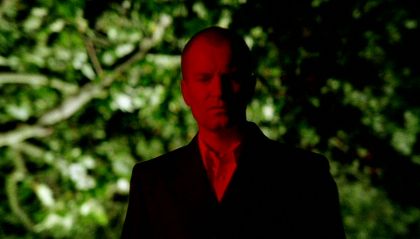
Part of the film takes place in a small section of Copenhagen called "The Zone", a supposedly closed off and impenetrable area that appears to be just another part of town but with an invisible screen that ripples when touched. Thomsen's journey to retrieve his memories takes him into The Zone, through a maze of streets, halls and doors that never remain constant. One scene, when Thomsen opens the door of a dark hallway to find himself in a forest made me think of the novels of Haruki Murakami, who also explores art and memory. This description by Matt Thompson in "The Guardian" could well fit Boe's narrative: It is more a case of "finding something." To generalize, Murakami's main character tends to be a man who is somewhat out of touch with his own feelings. Through his encounters with women, he discovers clues as to how his sense of self became unraveled. The man is a detective, but the crime has somehow happened within himself.
As humorless as Ulrich Thomsen is in Allegro, Boe is playful. There is a deadpan sense of humor regarding The Zone, with Thomsen finding himself in unlikely places. Part of the narrative is animated, with simple black and white drawings of the pianist as a young boy, with his piano and his box of memories. I am baffled that Allegro was not as well received theatrically as Reconstruction, especially as it more easy to understand and appreciate with a single viewing. Of course it is quite possible that like Resnais's past films, especially Je T'Aime, Je T'Aime, which were not appreciated at the time of their initial release, Allegro may well find its audience in the future.
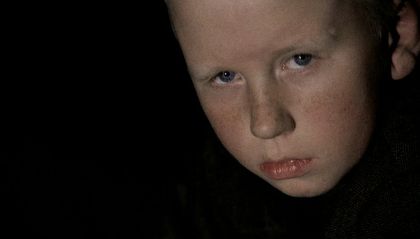
Posted by Peter Nellhaus at 08:17 AM
October 14, 2007
Coffee Break

Rainer Werner Fassbinder, Brigitte Mira and Irm Hermann in Ali: Fear Eats the Soul (Rainer Werner Fassbinder - 1974)
Posted by Peter Nellhaus at 12:40 AM
October 12, 2007
The Close-Up Blog-a-thon: Opera
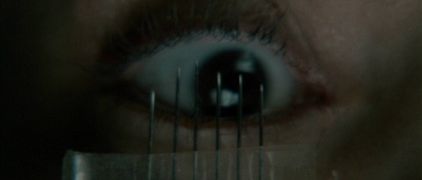


Dario Argento - 1987
Anchor Bay Region 0 DVD
For more close-ups of close-ups, visit The House Next Door.
Opera begins literally with a bird's eye view of an opera in rehearsal. In several shots the audience sees the rehearsal reflected on the eye of a crow, one of several used in the avant-gard staging of "the Scottish play". Dario Argento's film can be seen as being a dramatic account of the curse of "the Scottish play". In a roundabout way, Opera is about the act of watching horror films.

The acting of watching a horror movie is always a kind of dare. The toughest among us can look at the what happens on the screen with a sense of detachment, or better yet, amusement. The more sensitive will close their eyes, cover them with their hands or in some way hide from the on-screen mayhem. There is also the discovery that often what one actually does see on the screen is far less horrible than what one may imagine.
What has become the iconic image of Cristina Marsillach's eyes, taped with the needles to stay open, stands as the image of the audience being forced to look, with the option of not looking taken away. In the case of the character, Betty, her choice is to view the violent deaths of people close to her, or cause herself tremendous physical pain and damage. Opera is full of close-ups of eyes, as well as close-ups in general, revealing bits of information to the audience in the form of details - black leather gloves, a stray bracelet, a feather, a pair of binoculars. In addition to the taping of Betty's eyes, the narrative is about the act of seeing in identifying the killer.
The camera, of course, acts as the eyes of the audience. In this way, Argento plays with the audience by reminding them of how vulnerable the eyes are physically, as well as playing with the idea of horror as both what one sees, does not see, or imagines that is seen. Implicating the audience is not unique in itself except that Opera is both partially autobiographical, refering to Argento's own attempts to stage opera, and critical of the kind of classism that divides performing arts into highbrow (opera) and lowbrow (horror movies). In addition to the operas inspired by the plays of Shakespeare, there is the violence and spectacle in such operas as Turandot and Salome. For Dario Argento, madness is both the motivation and the result of being an artist.
As it turns out, there is another Argento involved in opera. I don't know how much either is aware of the other, but it is interesting to note that both Argentos share an interest in Edgar Allen Poe, whose own writings were about madness, art and doppelgangers. Of further coincidence is that Dario Argento's film Trauma was shot on location at Dominick Argento's home turf of Minneapolis. And in discussing Poe, Dario Argento made a statement that could well refer back to Opera - "Is it right to be obsessed with looking at terrible things and sharing them with other people, especially when many people are perturbed by them?"

Posted by Peter Nellhaus at 12:45 AM | Comments (4)
October 10, 2007
Mill of the Stone Women

Il Mulino delle Donne di Pietra
Giorgio Ferroni - 1960
Mondo Macabro Region 0 DVD
I continue to seek out films mentioned in Cathal Tohill and Pete Tombs' Immoral Tales: European Sex & Horror Movies 1956-1984. Even if the artistic merits are debatable, most of the films I've seen are fun to watch. Tohill and Tombs devote a chapter to Mill of the Stone Women which I would re-read and refer to were it not currently in storage.
What makes Mill of the Stone Women striking to watch is the atmospheric color photography. Even if one can pick away at all the derivative elements of the screenplay, one can not deny the evocative lighting and use of shadows. For those who have spent too many hours watching too many horror films from this era, it comes as no surprise that the art professor specializes in the Walter Paisley school of sculpture.

Mill of the Stone Women has developed a cult in part because of Dany Carrel's brief exposure of a nipple. It seems possible that no one realized that Carrel's top was slipping until it was too late to refilm. Ferroni seemed aware that one of the big selling points of the Hammer films was the casting of well endowed young women, and answers his English competition with a shot of Liana Orfei in an impressive silhouette. While most comments about Scilla Gabel compare her to Sophia Loren, Ferroni and cinematographer Pier Pavoni light her in a way that is suggestive of Barbara Steele. Mondo Macabro helpfully includes cheesecake shots of Carrel and Gabel as part of the DVD supplements.

Posted by Peter Nellhaus at 12:41 PM | Comments (2)
October 08, 2007
War-Gods of the Deep

Jacques Tourneur - 1965
MGM Region 1 DVD
How many film directors know when they are making their last film? I had read that Nicholas Ray had a dream while filming 55 Days in Peking that his career as he knew it was over. The other point of interest is how filmmakers can still leave their imprint on films that either came about as assignments, or that were made in spite of constant interference. I have yet to read Chris Fujiwara's book on Jacques Tourneur, but am inspired to do so primarily to compare what has been documented about the making of War-Gods of the Deep with my own speculations.
That Tourneur's final work was originally written by his Night of the Demon collaborator Charles Bennett suggests thwarted promises of what might have been a better film. There is the argument that Night of the Demon might have also been better had their been no studio interference. What is certain is that in spite of some woeful casting and re-writing, War-Gods of the Deep has visual and thematic links to Tourneur's films produced by Val Lewton.

I imagine Tourneur arguing with the production executives about showing as little as possible of the underwater "gill men". The most interesting of these semi-human creatures is first seen mostly in the shadows, marked by a long Mohawk hair-do. Subtlety was rarely valued at American-International Pictures, and the film ends with more revealing shots of the monsters, looking mostly like submerged, malevelont Teletubbies. I would like to imagine that what Tourneur and Bennett had in mind were creatures indirectly related to the animal-human hybrids out of the past, the cat people and leopard men.
It is with the same spirit that this tale, told mostly in the dark, reminded me also Berlin Express in which the characters find themselves lost in a maze of ruins. Even the giant, unexplained statues are reminders of Tourneur's previous explorations into men and myths. What does not help is the casting of Tab Hunter and the blandly attractive Susan Hart as the romantic leads. Far better are Vincent Price in a well-modulated performance, and character actor John Le Mesurier in a role orignally pegged for Boris Karloff. Louis Heyward's hand in re-writing the film for the presumed American-International audience is evident in broad comedy with David Tomlinson and a pet chicken named Herbert. There is greater humor in the suggestion that Susan Hart's character, believed by Price to be the reincarnation of his dead wife, has the faintly aquatic last name of Tregillis, as if she could be an unknowing descendent of the ocean creatures.
Certainly one should consider what Fujiwara has said in describing Tourneur in putting his films in context, "Tourneur seems never to have been completely at home in America, and lots of his films are about outsiders, about being 'strange' in a place. They have a similar emotional quality to the books of Marguerite Duras: both are concerned with people remote from each other and themselves, who inhabit weird, distant realms. Yet Tourneur allows us a kind of nostalgic connection with his characters, even to fall in love with them."

Posted by Peter Nellhaus at 12:24 AM | Comments (3)
October 07, 2007
Coffee Break
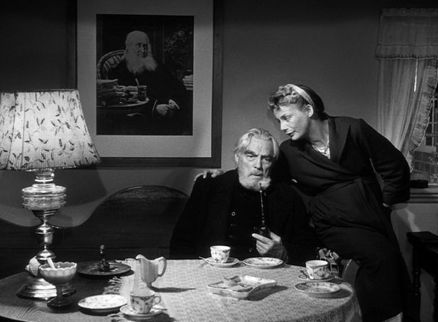
Henrik Malberg and Birgitte Federspiel in Ordet (Carl Theodor Dreyer - 1955)
Posted by Peter Nellhaus at 02:35 AM | Comments (1)
October 05, 2007
31 Favorite Horror Films
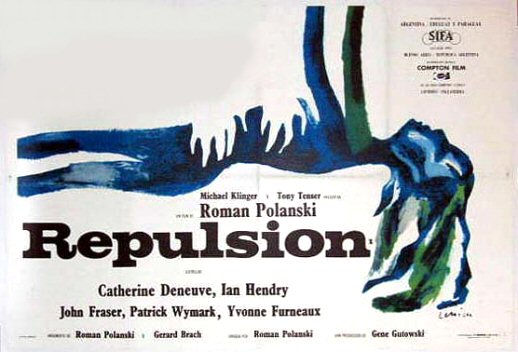
A couple of weeks ago, Ed Hardy, Jr. requested lists of 31 favorite horror films. Because of personal obligations, it wasn't until last night that I was able to compile a list. Unlike some of my previous lists, I have included a few comments. While I have attempted to include as many different filmmakers as possible, the truth is that the best horror films are made by those who explored the genre several times, if not exclusively. After the first few films, ranking becomes abitrary. Some of these films are not scary but remain fun to watch. Other films remain intense in spite of multiple viewings.

1. Psycho (Alfred Hitchock - 1960)
There is no way of getting around it. Even if Psycho was Hitchcock's way of getting back at William Castle, the film defines the modern horror movie, and remains an influence on virtually every filmmaker working in the genre.
2. Suspiria (Dario Argento - 1977)
Even after several viewings, this if for me one the scariest films ever made. The shot of Jessica Harper stepping out of the airport, the wind blowing her hair, is magical. Argento, a former film critic, makes a nod to Hitchcock and Lang in the casting of Alida Valli and Joan Bennett.
3. Repulsion (Roman Polanski - 1965)
I ducked in my seat at the Thalia Theater when I saw Catherine Deneuve as the beautician from hell.
4. Nosferatu (F.W. Murnua - 1922)
Murnau’s Dracula by any other name is no blood drinking, caped dandy, but a rat faced demon who still thrills and chills.
5. Bride of Frankenstein (James Whale - 1935)
Funnier than almost an horror spoof you could name. I also love this film for Elsa Lanchester's hair-do.
6. Tomb of Ligeia (Roger Corman - 1964)
I love the Corman-Poe films. For me, this is the best.
7. Deep Red (Dario Argento - 1975)
Argento making something that goes beyond giallo. Where does that killer doll come from? A great score by the appropriately named group Goblin.
8. The Mummy (Karl Freund - 1932)
I saw this film almost every day on television when I was nine years old. I still find it fascinating.
9. Eyes without a Face (Georges Franju - 1960)
I don’t know how much credit should go to Georges Franju and how much should go to screenwriters Boileau and Narcejac. The image of Juliette Mayniel in the white mask has become iconic.
10. Black Sunday (Mario Bava - 1960)
Barbara Steele is both scary and beautiful.
11. The Unknown (Tod Browning - 1927)
I couldn't make a list without one film with Lon Chaney or Tod Browning. This may be their most horrifying film because of what is left to the imagination. Also worth seeing to catch Joan Crawford as a total babe.
12. Brides of Dracula (Terence Fisher - 1960)
No brides and no Dracula, but Terence Fisher’s best film for it’s creative use of color - reds, blues, and purple.

13. Kill, Baby, Kill (Mario Bava - 1966)
My favorite Bava. Follow the bouncing ball.
14. Onibaba (Kaneto Shindo - 1964)
The horror of the mask that can not be removed from the woman’s face unnerved me when I saw this on the big screen at the New Yorker Theater.
15. The Thing (John Carpenter - 1982)
Much of the time, John Carpenter seems to be remaking Rio Bravo. This time Carpenter used Howard Hawks for inspiration to make something darker and much more horrifying than the first film.
16. Night of the Living Dead (George Romero - 1968)
George Romero upped the ante on on screen horror and reinvented the zombie film. That the film is also a political allegory, and is the first film in general release with a black hero are bonus points.
17. Shivers (David Cronenberg - 1975)
I had read about Cronenberg's short films, Stereo and Crimes of the Future, probably in "Take One" magazine. The only way I could see Cronenberg's first feature was to go to 42nd Street, back when it was a bit more colorful. I wasn't the only one in the audience to be freaked by Cronenberg's vision of sex and horror. That hasn't stopped me from seeing Cronenberg's films since then.
18. The Eye (Danny Pang & Oxide Pang - 2002)
The Pang Brothers defined the Asian horror film. We will have to see if the remake can match the apocalyptic ending of the orignal.
19. The Invisible Man (James Whale - 1933)
Considering that CGI was almost fifty years away, the special effects of The Invisible Man still amaze me.
20. Night of the Demon (Jacques Tourneur - 1957)
My favorite horror film by Jacques Tourner. Even the trees are scary.
21. Cat People (Paul Schrader -1982)
A gory reworking of Jacques Tourner’s film with a terrific cast and David Bowie singing about putting out fire with gasoline. Also the one film directed by Paul Schrader that I enjoy seeing more than once.
22. The Devils (Ken Russell - 1971)
I left the theater totally disheveled. A friend saw me the night I saw The Devils. After she saw Russell’s film, she understood why I looked like a wreck.
23. Carrie (Brian De Palma - 1976)
Even after several viewings, I still jump when those hands pop out from the grave.
24. Sisters (Brian De Palma - 1973)
Sure it’s an obvious hommage to Hitchcock, but De Palma does it better than anyone else. Even former Hitchcock scripter Sidney Gilliat bungled the job.
25. Freaks (Tod Browing - 1932)
You want to look away, but you can’t.
26. The Haunting (Robert Wise - 1963)
One of the things I liked about Robert Wise was how he would revisit a genre every ten years or so. One may want to explore the thematic trilogy that also includes Curse of the Cat People and Audrey Rose.
27. Captain Kronos, Vampire Hunter (Brian Clemens - 1974)
One of the last Hammer films, and one of the best. Underseen and underappreciated.
28. The Tenant (Roman Polanski - 1976)
The Polanski film that caused one of my ownly film inspired nightmares.
29. Dead Ringers (David Cronenberg - 1988)
I could have listed several films by David Cronenberg. This film is especially creepy and disturbing, and beautiful.
30. Whatever Happened to Baby Jane? (Robert Aldrich - 1962)
For better and worse, Robert Aldrich created a genre and extended the careers not only of Bette Davis and Joan Crawford, but almost every Depression era female star in Hollywood.
31. Carnival of Souls (Herk Harvey - 1962)
Herk Harvey’s little film is effectively creepy. That it inspired George Romero is another reason to love this film.

Posted by Peter Nellhaus at 12:54 AM | Comments (5)
October 02, 2007
First Day of Chez Moi

I have a true tale of horror. Please look away now as this story is not for the faint of heart.
I thought I would be buying a new house last week. After a few false starts, I thought I had things set up, even after the original five percent down jumped to ten percent. Then the mortgage company pulled the plug on me on the day of the closing. It gets worse from here . . .
I had told the person that I was renting from that I was moving out on September 29th. My lease could not be extended because he had already set up rent with a new tenant. I ended up taking a day off from work to try and find a new place to rent as soon as possible. In the thirty years since I last had to look for a rental place, I found that it was not enough to have the money, everyone wanted credit and reference checks, prolonging the process. I ended up staying at a hotel for a few days. I do have a new place that I am moving into today. It will be a few days before I can write on a regular basis.
I should be able to post steadily again by the end of this week if all goes well. I won't have furniture, as it is still in storage in Florida, but I should have internet and my trusty laptop which does double duty, for communications and watching DVDs.

Posted by Peter Nellhaus at 12:26 PM | Comments (3)